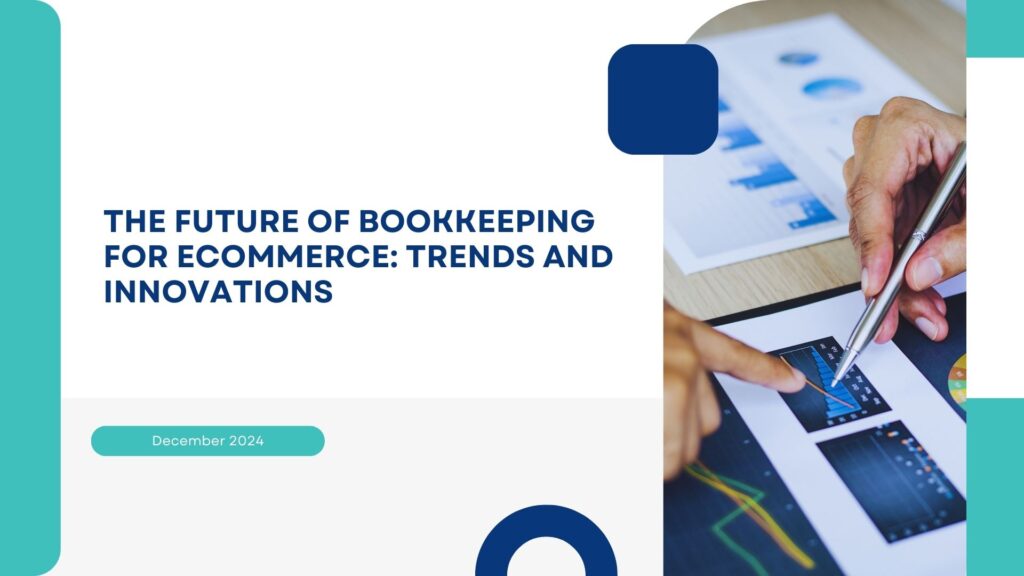The Future of Bookkeeping for Ecommerce: Trends and Innovations
This article examines the future of bookkeeping for ecommerce, highlighting emerging trends, innovations, and practical solutions to tackle the unique challenges faced by online businesses. As technology advances, innovative tools and methods are transforming the way ecommerce bookkeeping is managed, making it more efficient and insightful than ever before. Ceptrum is a brand that is redefining ecommerce bookkeeping through innovative solutions and customer-centric services. Bookkeeping has become a cornerstone for successful ecommerce businesses in today’s rapidly evolving digital marketplace; with the rise of online shopping and global marketplaces, businesses must adjust to modern bookkeeping strategies that align with the unique challenges of ecommerce accounting.
The Role of Ecommerce Bookkeeping in Business Success
Ecommerce bookkeeping is more than just tracking income and expenses; it’s a strategic tool for growth and sustainability. Proper bookkeeping ensures compliance with tax regulations, enables better financial decision-making, and provides insights into profitability and performance.
Key Challenges in Ecommerce Accounting
Managing finances in an ecommerce setting can be complicated. Challenges include:
- Sales across multiple channels: Tracking revenue from platforms like Shopify, Amazon, and eBay.
- Currency conversions: Handling international transactions seamlessly.
- Inventory management: Aligning inventory costs with sales for accurate reporting.
- Tax compliance: Navigating state, local, and international tax obligations.
To address these complexities, innovative trends and technologies are emerging, reshaping the future of ecommerce bookkeeping.
Trends Shaping the Future of Ecommerce Bookkeeping
1. Bookkeeping Automation
The revolution in bookkeeping is led by automation. Data entry, reconciliation, and reporting are becoming easier with the help of programs like Xero, QuickBooks, and Ceptrum’s solutions. Automated solutions offer real-time financial insights, save time, and minimize errors.
2. Integration with Platforms for E-Commerce
Modern bookkeeping systems can connect with well-known e-commerce sites like WooCommerce, Amazon, and Shopify. Without requiring manual involvement, this integration guarantees proper recording of all transactions, refunds, and fees.
3. Cloud-Based Solutions
The shift to cloud-based bookkeeping is enabling businesses to access financial data anytime, anywhere. Cloud solutions also enhance collaboration between business owners and accountants, allowing for better financial oversight.
4. Analytics Driven by AI
The analysis of data in bookkeeping is being revolutionized by artificial intelligence. Based on past data, AI-powered programs can spot patterns, forecast future trends, and even provide financial advise.
5. Pay Attention to Sustainability
Bookkeeping is being impacted by eco-friendly practices as companies place a higher priority on sustainability. Digital invoices, eco-friendly expense monitoring, and paperless solutions are all growing more popular.
6. Sophisticated Tools for Tax Compliance
An essential component of e-commerce bookkeeping is tax compliance. These days, cutting-edge systems are made to monitor tax laws in several jurisdictions, guaranteeing that companies stay in compliance and stay out of trouble.
Ceptrum: A Leader in Innovative Bookkeeping Solutions
Ceptrum stands out among the numerous companies catering to the changing demands of e-commerce bookkeeping because of its creative and client-focused methodology. Using the newest technology, Ceptrum provides extensive bookkeeping services designed for e-commerce companies, including:
- Seamless integration with ecommerce platforms.
- Automated reconciliation and reporting.
- Advanced analytics for performance tracking.
- Robust tax compliance support.
By adopting solutions like those offered by Ceptrum, businesses can stay ahead of the curve and focus on scaling their operations.
Benefits of Embracing Modern Bookkeeping Practices
1. Enhanced Financial Precision
By lowering the possibility of mistakes, automation and artificial intelligence guarantee accurate and current financial records.
2. More Effective Decision-Making
Businesses may make well-informed decisions that spur growth when they have access to real-time insights into cash flow, profitability, and expenses.
3. Increased Productivity
Modern bookkeeping systems allow business owners to focus on their primary competencies by automating monotonous processes.
4. Financial Savings
Over time, substantial cost reductions result from streamlined procedures and fewer mistakes.
5. The ability to scale
Cutting-edge bookkeeping systems are made to expand with your company, handling higher transaction volumes and more complicated transactions.
The Future of Ecommerce Bookkeeping: What to Expect
As ecommerce continues to evolve, so will the tools and strategies for managing financial records. Key developments to watch include:
- Blockchain Integration: Ensuring secure and transparent financial transactions.
- Personalized Bookkeeping Services: Tailored solutions based on individual business needs.
- Greater Focus on Data Security: Protecting sensitive financial data through advanced encryption methods.
- More Accessible Solutions: Affordable and user-friendly tools for small and medium-sized businesses.
The future of ecommerce bookkeeping promises to be dynamic, with continuous advancements that simplify and enhance financial management.
Conclusion
E-commerce bookkeeping has a promising future thanks to innovation, automation, and integration. These developments open up new avenues for efficiency and growth in addition to addressing the particular difficulties associated with e-commerce accounting. Businesses can streamline their bookkeeping procedures and secure long-term success in a cutthroat market by implementing cutting-edge solutions like those provided by Ceptrum.
Maintaining an edge in bookkeeping is crucial for expansion and sustainability, regardless of the size of your e-commerce business. Your company will be ready for the challenges of the future if you invest in cutting-edge equipment and professional services now.
FAQs
1. What is ecommerce bookkeeping?
Ecommerce bookkeeping involves tracking, recording, and managing financial transactions specific to online businesses, including sales, expenses, and tax obligations.
2. Why is bookkeeping important for ecommerce businesses?
Bookkeeping ensures accurate financial records, compliance with tax regulations, and insights into profitability, all of which are essential for business growth.
3. How does automation benefit ecommerce bookkeeping?
Automation simplifies repetitive tasks, reduces errors, and provides real-time financial insights, saving time and resources for businesses.
4. What services does Ceptrum offer for ecommerce bookkeeping?
Ceptrum offers comprehensive bookkeeping solutions, including platform integration, automated reconciliation, advanced analytics, and tax compliance support.
5. What trends are shaping the future of ecommerce bookkeeping?
Key trends include automation, AI-driven analytics, cloud-based solutions, and advanced tax compliance tools, all of which enhance efficiency and accuracy.

